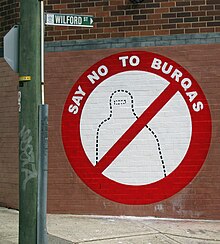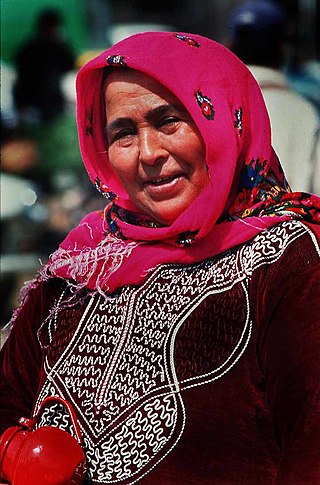
In modern usage, hijab generally refers to various head coverings conventionally worn by many Muslim women. It is similar to the tichel or snood worn by Orthodox Jewish women, certain headcoverings worn by some Christian women, such as the mantilla, apostolnik and wimple, and the dupatta worn by many Hindu and Sikh women. Whilst a hijab can come in many forms, it often specifically refers to a scarf wrapped around the head, covering the hair, neck and ears but leaving the face visible. The use of the hijab has been on the rise worldwide since the 1970s and is viewed by many Muslims as expressing modesty and faith; it has also been worn for purposes of adornment. When it comes to the obligation for a Muslim woman to cover her hair and body, many have expressed confusion about the origin of this commandment. However, there has never been any debate within Sunni Islamic scholarship at any point in history regarding the obligation of hijab for all Muslim women who have reached the age of puberty.

A burqa or a burka is an enveloping outer garment worn by some Muslim women which fully covers the body and the face. Also known as a chadaree or chaadar in Afghanistan, or a paranja in Central Asia, the Arab version of the burqa is called the boshiya and is usually black. The term burqa is sometimes conflated with the niqāb even though, in more precise usage, the niqab is a face veil that leaves the eyes uncovered, while a burqa covers the entire body from the top of the head to the ground, with a mesh screen which only allows the wearer to see in front of her.

Islamic clothing is clothing that is interpreted as being in accordance with the teachings of Islam. Muslims wear a wide variety of clothing, which is influenced not only by religious considerations, but also by practical, cultural, social, and political factors. In modern times, some Muslims have adopted clothing based on Western traditions, while others wear modern forms of traditional Muslim dress, which over the centuries has typically included long, flowing garments. Besides its practical advantages in the climate of the Middle East, loose-fitting clothing is also generally regarded as conforming to Islamic teachings, which stipulate that body areas which are sexual in nature must be hidden from public view. Traditional dress for Muslim men has typically covered at least the head and the area between the waist and the knees, while women's islamic dress is to conceal the hair and the body from the ankles to the neck. Some Muslim women also cover their face. However, other Muslims believe that the Quran strictly mandate that women need to wear a hijab or a burqa.

A niqāb or niqaab, also known as a ruband, is a long garment worn by some Muslim women in order to cover their entire body and face, excluding their eyes. It is an interpretation in Islam of the concept of hijab, and is worn in public and in all other places where a woman may encounter non-mahram men. Most prevalent in the Arabian Peninsula, the niqab is a controversial clothing item in many parts of the world, including in some Muslim-majority countries.
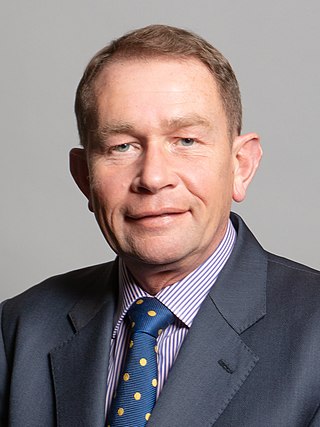
Philip Thomas Hollobone is a British Conservative Party politician and former investment banker. He was the Member of Parliament for Kettering from the 2005 general election to the 2024 United Kingdom general election.

Cory Bernardi is an Australian conservative political commentator and former politician. He was a Senator for South Australia from 2006 to 2020, and was the leader of the Australian Conservatives, a minor political party he founded in 2017 but disbanded in 2019. He is a former member of the Liberal Party of Australia, having represented the party in the Senate from 2006 to 2017. He is the author of The Conservative Revolution.

The British debate over veils began in October 2006 when the MP and government minister Jack Straw wrote in his local newspaper, the Lancashire Evening Telegraph, that, while he did not want to be "prescriptive", he preferred talking to women who did not wear a niqab as he could see their face, and asked women who were wearing such items to remove them when they spoke to him, making clear that they could decline his request and that a female member of staff was in the room.
Hijab and burka controversies in Europe revolve around the variety of headdresses worn by Muslim women, which have become prominent symbols of the presence of Islam in especially Western Europe. In several countries, the adherence to hijab has led to political controversies and proposals for a legal partial or full ban in some or all circumstances. Some countries already have laws banning the wearing of masks in public, which can be applied to veils that conceal the face. Other countries are debating similar legislation, or have more limited prohibitions. Some of them apply only to face-covering clothing such as the burqa, boushiya, or niqab; some apply to any clothing with an Islamic religious symbolism such as the khimar, a type of headscarf. The issue has different names in different countries, and "the veil" or hijab may be used as general terms for the debate, representing more than just the veil itself, or the concept of modesty embodied in Hijab.

Various styles of head coverings, most notably the khimar, hijab, chador, niqab, paranja, yashmak, tudong, shayla, safseri, carşaf, haik, dupatta, boshiya and burqa, are worn by Muslim women around the world, where the practice varies from mandatory to optional or restricted in different majority Muslim and non-Muslim countries.

George Robert Christensen is an Australian politician, currently serving as a member of the Mackay Regional Council. He was a member of the House of Representatives from 2010 to 2022, serving as the member for the division of Dawson. He was a member of the Liberal National Party of Queensland and sat with the National Party in federal parliament, prior to leaving the party in April 2022 to join One Nation just days before the end of his parliamentary term.
The French ban on face covering is the result of an act of parliament passed in 2010 banning the wearing of face-covering headgear, including masks, helmets, balaclavas, niqābs and other veils covering the face, and full body costumes and zentais in public places, except under specified circumstances. This ban does not apply to the hijab, as it does not cover the face. The ban does apply to the burqa, a full-body covering, if it covers the face. In April 2011, France became the first European country to impose a ban on full-face veils in public areas.
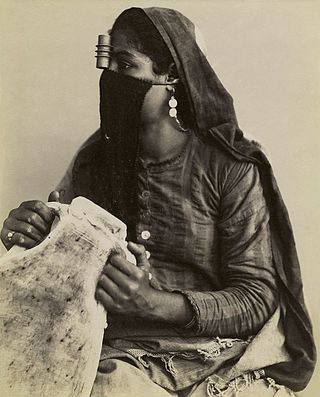
In a predominantly Muslim society, as many as 90% of women in Egypt have adopted a form of veiling. A majority of Egyptian women cover at least their hair with the hijab. A hijab refers to a head covering that is worn by Muslim women. Although the phenomenon of wearing the niqāb, a veil which covers the face is not as common, the niqab in Egypt has become more prevalent. While a few women in Egypt wear a black niqab along with a billowing black abaya as seen in countries such as Saudi Arabia, many choose to wear different colors of the niqab or manipulate the hijab to cover their face. Regardless, the growing trend of munaqqabat, or women who wear the niqab, has alarmed the authorities. They have begun to see this dress as a security threat, because it hides the face, and because it is perceived as a political statement, a rejection of the state in favor of a strict Islamic system.

Sergio Redegalli is an Australian glass artist specialising in glass sculptures. He is an owner of the Cydonia Glass Studio located in Newtown, New South Wales. Redegalli graduated from Sydney College of the Arts with a Bachelor of Arts Glass in 1984 and a Graduate Diploma – Glass Visual Arts in 1988. Whilst attending college, Redegalli has claimed, he was the subject of victimisation at the hands of "man hating lesbians". His glass sculpture Cascade was commissioned for the World Expo in Brisbane in 1988. This massive 12 ton sculpture in the shape of a cascading wave is on display in Adelaide Botanic Garden, Adelaide. He is currently the President of the Chamber of Commerce, at Tocumwal in the Riverina region of New South Wales.

Jacquiline Louise Lambie is an Australian politician who is the leader and founder of the Jacqui Lambie Network (JLN). She is a Senator for Tasmania since 2019, and was previously a Senator from 2014 to 2017.
Anti-mask or anti-masking laws are legislative or penal initiatives prohibiting the concealment of one's face in public. Anti-mask laws vary widely between jurisdictions in their intent, scope, and penalties.
Islamophobia in Canada refers to a set of discourses, behaviours and structures which express feelings of anxiety, fear, hostility and rejection towards Islam or Muslims in Canada.
Muslim Women's National Network Australia (MWNNA) is an association in Australia which represents a network of progressive Muslim women's organisations and individual Muslim women. MWNNA runs events and projects for Muslim women, and represents their views to media and government organisations.
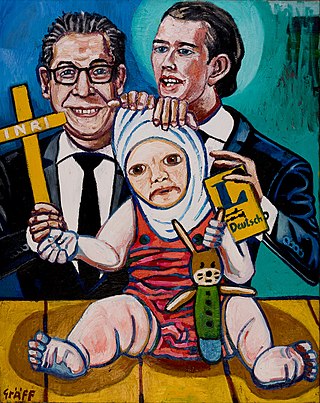
Hijabophobia is a type of religious and cultural discrimination against Muslim women who wear the hijab. The discrimination has had manifestations in public, working and educational places.

Islamic feminist views on dress codes include views on issues surrounding women's dress codes in Islam, especially on the hijab and niqāb.

The burqa is worn by women in various countries. Some countries have banned it in government offices, schools, or in public places and streets.

